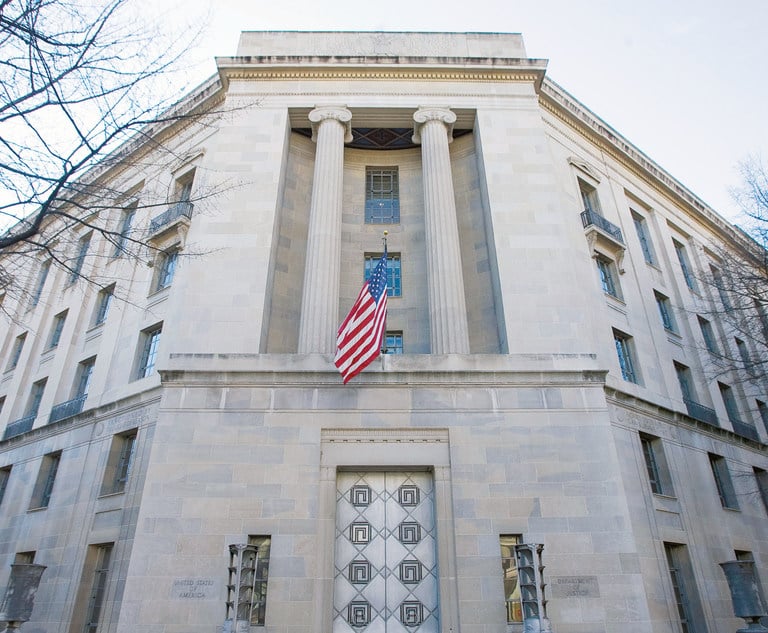White Noise
During his keynote address at lunch, William Donaldson, the former SEC chairman, talked at length about how SOX is the right medicine to cure corporate America's ills.
April 30, 2006 at 08:00 PM
6 minute read
William Donaldson was lucky he didn't get roughed up in the Four Seasons' parking lot after Foley & Lardner's recent conference for directors and in-house counsel in Chicago.
During his keynote address at lunch, the former SEC chairman (who was a surprisingly unimpressive speaker) talked at length about how SOX is the right medicine to cure corporate America's ills. That solicited some eye rolling from the directors at my table. Donaldson then talked about how independent directors are making America's boardrooms more responsive to shareholders.
That was too much to take for one person seated at my table. He turned to me and said, “Independent directors are a disaster. They know nothing about the company, the industry or the business.”
My tablemate is part of growing chorus of vocal critics of SOX (or portions of it). And that chorus is getting louder. Ken Starr, for instance, recently filed suit on behalf of the Free Enterprise Fund challenging the constitutionality of the PCAOB. That suit's ultimate goal, it seems, is to force Congress to take a second look at the Act. Soon after Starr filed suit, the SEC's advisory committee on small public companies told SEC officials they should exempt small and micro cap companies from the more onerous requirements of 404. Christopher Cox decided not to follow the recommendations, which would have exempted 80 percent of public companies from reporting on their internal controls. Then the Chamber of Commerce had its turn, releasing a none-too-flattering report accusing the SEC of being overzealous in its enforcement of securities laws.
Perhaps the most scathing criticism of SOX and its enforcers, though, came from a panel at the Foley conference that was discussing investor relations. Several panelists said investors don't really care that much about governance and the makeup of the board. They also said investors aren't too concerned when a company admits it has made an accounting error. The reason, they said, is because so many companies in the past 12 months have had to report an accounting mistake.
The fact that investors don't seem to care is a pretty shocking development. Two years ago, an admission of an accounting error would send a stock tumbling. Today it barely makes it into Section A of the Wall Street Journal. These admissions have become white noise. And that may be the most significant failure of the great experiment that is SOX.
William Donaldson was lucky he didn't get roughed up in the Four Seasons' parking lot after
During his keynote address at lunch, the former SEC chairman (who was a surprisingly unimpressive speaker) talked at length about how SOX is the right medicine to cure corporate America's ills. That solicited some eye rolling from the directors at my table. Donaldson then talked about how independent directors are making America's boardrooms more responsive to shareholders.
That was too much to take for one person seated at my table. He turned to me and said, “Independent directors are a disaster. They know nothing about the company, the industry or the business.”
My tablemate is part of growing chorus of vocal critics of SOX (or portions of it). And that chorus is getting louder. Ken Starr, for instance, recently filed suit on behalf of the Free Enterprise Fund challenging the constitutionality of the PCAOB. That suit's ultimate goal, it seems, is to force Congress to take a second look at the Act. Soon after Starr filed suit, the SEC's advisory committee on small public companies told SEC officials they should exempt small and micro cap companies from the more onerous requirements of 404. Christopher Cox decided not to follow the recommendations, which would have exempted 80 percent of public companies from reporting on their internal controls. Then the Chamber of Commerce had its turn, releasing a none-too-flattering report accusing the SEC of being overzealous in its enforcement of securities laws.
Perhaps the most scathing criticism of SOX and its enforcers, though, came from a panel at the Foley conference that was discussing investor relations. Several panelists said investors don't really care that much about governance and the makeup of the board. They also said investors aren't too concerned when a company admits it has made an accounting error. The reason, they said, is because so many companies in the past 12 months have had to report an accounting mistake.
The fact that investors don't seem to care is a pretty shocking development. Two years ago, an admission of an accounting error would send a stock tumbling. Today it barely makes it into Section A of the Wall Street Journal. These admissions have become white noise. And that may be the most significant failure of the great experiment that is SOX.
This content has been archived. It is available through our partners, LexisNexis® and Bloomberg Law.
To view this content, please continue to their sites.
Not a Lexis Subscriber?
Subscribe Now
Not a Bloomberg Law Subscriber?
Subscribe Now
NOT FOR REPRINT
© 2025 ALM Global, LLC, All Rights Reserved. Request academic re-use from www.copyright.com. All other uses, submit a request to [email protected]. For more information visit Asset & Logo Licensing.
You Might Like
View All

State AG Hammers Homebuilder That Put $2,000-Per-Day Non-Disparagement Penalty in Buyer Contracts
3 minute read
Advance Auto Parts Hires GC Who Climbed From Bottom to Top of Lowe's Legal Department
2 minute read
Trending Stories
- 1Parties’ Reservation of Rights Defeats Attempt to Enforce Settlement in Principle
- 2ACC CLO Survey Waves Warning Flags for Boards
- 3States Accuse Trump of Thwarting Court's Funding Restoration Order
- 4Microsoft Becomes Latest Tech Company to Face Claims of Stealing Marketing Commissions From Influencers
- 5Coral Gables Attorney Busted for Stalking Lawyer
Who Got The Work
J. Brugh Lower of Gibbons has entered an appearance for industrial equipment supplier Devco Corporation in a pending trademark infringement lawsuit. The suit, accusing the defendant of selling knock-off Graco products, was filed Dec. 18 in New Jersey District Court by Rivkin Radler on behalf of Graco Inc. and Graco Minnesota. The case, assigned to U.S. District Judge Zahid N. Quraishi, is 3:24-cv-11294, Graco Inc. et al v. Devco Corporation.
Who Got The Work
Rebecca Maller-Stein and Kent A. Yalowitz of Arnold & Porter Kaye Scholer have entered their appearances for Hanaco Venture Capital and its executives, Lior Prosor and David Frankel, in a pending securities lawsuit. The action, filed on Dec. 24 in New York Southern District Court by Zell, Aron & Co. on behalf of Goldeneye Advisors, accuses the defendants of negligently and fraudulently managing the plaintiff's $1 million investment. The case, assigned to U.S. District Judge Vernon S. Broderick, is 1:24-cv-09918, Goldeneye Advisors, LLC v. Hanaco Venture Capital, Ltd. et al.
Who Got The Work
Attorneys from A&O Shearman has stepped in as defense counsel for Toronto-Dominion Bank and other defendants in a pending securities class action. The suit, filed Dec. 11 in New York Southern District Court by Bleichmar Fonti & Auld, accuses the defendants of concealing the bank's 'pervasive' deficiencies in regards to its compliance with the Bank Secrecy Act and the quality of its anti-money laundering controls. The case, assigned to U.S. District Judge Arun Subramanian, is 1:24-cv-09445, Gonzalez v. The Toronto-Dominion Bank et al.
Who Got The Work
Crown Castle International, a Pennsylvania company providing shared communications infrastructure, has turned to Luke D. Wolf of Gordon Rees Scully Mansukhani to fend off a pending breach-of-contract lawsuit. The court action, filed Nov. 25 in Michigan Eastern District Court by Hooper Hathaway PC on behalf of The Town Residences LLC, accuses Crown Castle of failing to transfer approximately $30,000 in utility payments from T-Mobile in breach of a roof-top lease and assignment agreement. The case, assigned to U.S. District Judge Susan K. Declercq, is 2:24-cv-13131, The Town Residences LLC v. T-Mobile US, Inc. et al.
Who Got The Work
Wilfred P. Coronato and Daniel M. Schwartz of McCarter & English have stepped in as defense counsel to Electrolux Home Products Inc. in a pending product liability lawsuit. The court action, filed Nov. 26 in New York Eastern District Court by Poulos Lopiccolo PC and Nagel Rice LLP on behalf of David Stern, alleges that the defendant's refrigerators’ drawers and shelving repeatedly break and fall apart within months after purchase. The case, assigned to U.S. District Judge Joan M. Azrack, is 2:24-cv-08204, Stern v. Electrolux Home Products, Inc.
Featured Firms
Law Offices of Gary Martin Hays & Associates, P.C.
(470) 294-1674
Law Offices of Mark E. Salomone
(857) 444-6468
Smith & Hassler
(713) 739-1250






